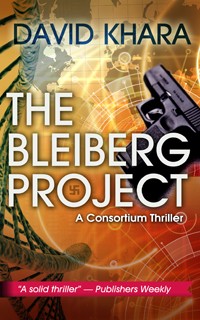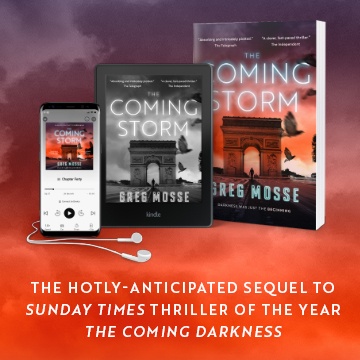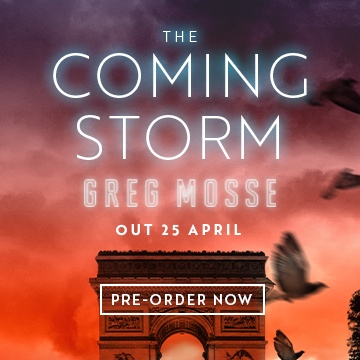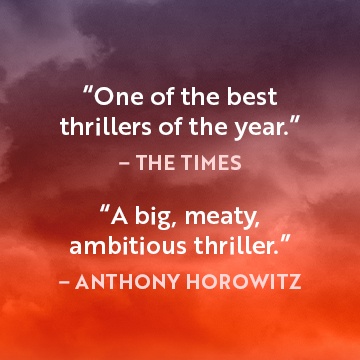 Formerly a copywriter and an entrepreneur, French author David Khara’s crime fiction career had a dream start. His first book wasn’t intended for publication, but found its way into an editor’s hands. His second book, The Bleiberg Project, is a thriller with links to World War II and has been a hit in France. On 30 April, you’ll also be able to buy it in English. I caught up with him at the Quais du Polar festival in Lyon, where there was a tremendous buzz about this exciting new author.
Formerly a copywriter and an entrepreneur, French author David Khara’s crime fiction career had a dream start. His first book wasn’t intended for publication, but found its way into an editor’s hands. His second book, The Bleiberg Project, is a thriller with links to World War II and has been a hit in France. On 30 April, you’ll also be able to buy it in English. I caught up with him at the Quais du Polar festival in Lyon, where there was a tremendous buzz about this exciting new author.
Were you always interested in writing crime fiction?
Not at all. But when I turned 34, a friend of mine lost his wife in a car crash. I was worried about his state of mind, so I wrote a story just for him, sending him a chapter at a time, so as to keep him curious – a bit like Sheherezade. At some point I got too busy and didn’t write for a few weeks. To my surprise, a whole group of friends started protesting: ‘Hey, what happens next?’ It turned out that my friend had been forwarding the chapters to them and they were all eager to know more. So this is how I got started. I thought originally I would write just one book, get it out of my system and stop, but I enjoyed it. Then The Bleiberg Project was published, an influential TV reviewer liked it, so it became very successful. But I still think of myself primarily as a storyteller. I can tell my story in any format, whether it’s genre fiction, film or comic books.
Who inspires you?
The classics: Eugene Sue’s Mysteries of Paris, Alexandre Dumas, Shakespeare, but also Dennis Lehane’s Mystic River. I don’t read much crime fiction. I would love to read more now that I have friends in the genre. However, because of my past job in copy-writing, I am afraid that I will start imitating their words and rhythms too much. Or else get discouraged that they are so good and I can never reach their level. The truth is I have no ambition to be a great writer, it’s all about creating suspense, making readers want to turn the page.
Why is your book so short?
That was deliberate. It was always planned to be the first part of a trilogy. Things which don’t seem so important in the first volume will move centre-stage in the next book. It takes almost the whole first book to work out who the real hero is. The book is about the Second World War, its effect on people then and its consequences in the present day. So I needed more space for that and didn’t want to make one single book too long.
Besides, I liked the main character, I didn’t want to kill him off. In the first version he did die, but when I re-read it, it saddened me. I wanted an opportunity to get to know him better. I felt he was a complex character, both an archetypal hero but also potentially a dangerous man. I hadn’t finished with him yet.
 The Bleiberg Project doesn’t seem to be a traditional French thriller. It feels quite American in terms of characters, locations and style.
The Bleiberg Project doesn’t seem to be a traditional French thriller. It feels quite American in terms of characters, locations and style.
I’ve been raised in four different cultures, as have many people of my generation. Classic French literature, of course, but also cinema, which in the 1980s was dominated by US action films. Thirdly, comic book culture. Marvel was hugely popular in France – that’s how I learnt English. I have a huge collection of Spiderman, X-Men and other comics. Fourthly, the video games industry, which is all about storytelling nowadays. So all of us in the Western world have similar world views and cultural backgrounds. If the French style is about being boring, then I’m not interested in being part of that.
But I do also think that there is a problem of perception in the crime fiction genre: if it’s an American thriller, it must be violent and good. If it’s Scandinavian it must be noir and good. If it’s French, then it’s not so good. A good story is a good story no matter where it is told, but it does have to resonate with people elsewhere, outside your own immediate culture.
How much research goes into your books?
The whole trilogy is about hope and paying tribute to all victims of war, to people who were deported. All the characters were based on survivors’ testimonies. Everything here is factually based, although I do speculate with ‘what if?’ I spent about three years reading biographies of Nazi figures like Heydrich and Himmler. I watched lots of documentaries. But I only kept one or two per cent of that in the book, just enough to capture the mood and spirit of that period. My aim was to be respectful and honest about people’s suffering, rather than using it in a sensationalist way in order to make money.
One of the most beautiful things that happened to me was one guy who came up after a reading and said that some incidents described in the book were exactly what happened to him during the War. The most touching aspect of it was that his name was actually Bleiberg. That made it all worth while. I know I cannot claim great genius as a writer but I am absolutely honest in what I do. I cry at sad scenes, laugh at funny ones, I feel each scene deeply.
How do you write?
I write each chapter in order and then send it to a group of friends. I don’t mind discussing my work in progress and getting feedback. I don’t hang around waiting for inspiration. A book is 10 per cent about writing and 90 per cent rewriting and editing. I always read out loud to an audience. My natural inclination is for the classical style with long, embellished sentences, but I have learnt to adapt my style to the story: shorter sentences, punchier words. In some ways, I may be more suited to an American audience. One of the funniest compliments I ever received was from a French reviewer who said: ‘I would have liked to read this work in the English original…’
David Khara’s novel The Bleiberg Project has been translated into English by Le French Book and will be out on 30 April. Watch for our review. Discover more new French authors here.








